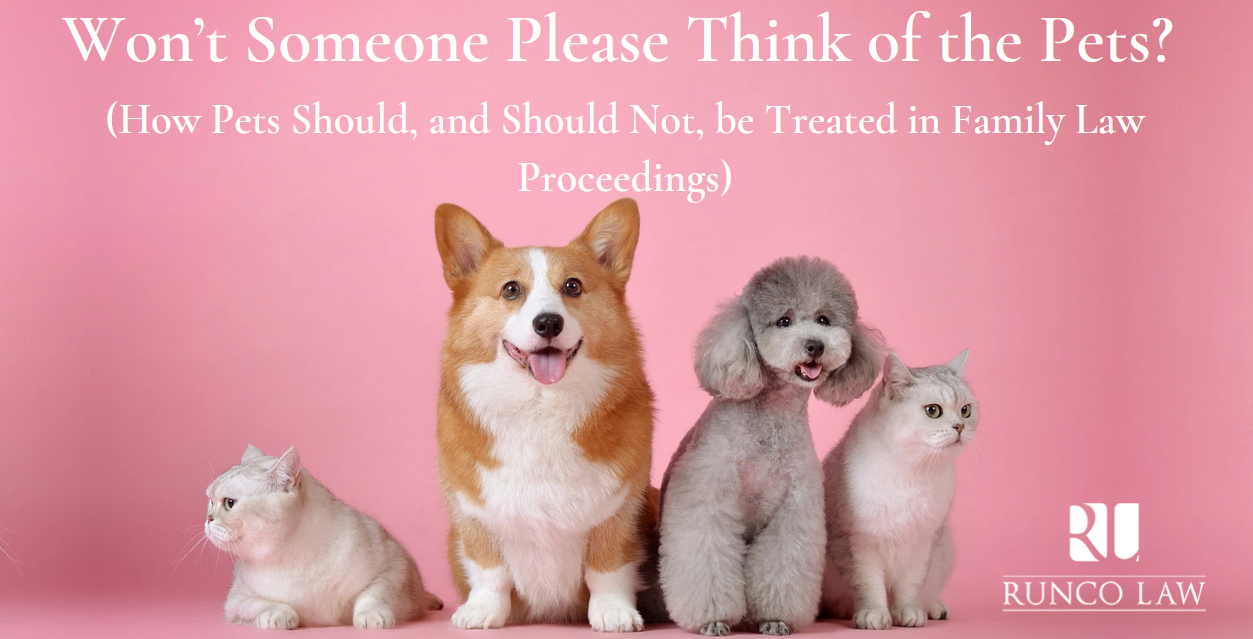Introduction
Over the past few years, I have written other blogs on “Won’t Someone Please Think of the Children” (Summer 2020) and “Won’t Someone Please Think of the Grandparents” (Late Fall 2022). I will complete my “trilogy” – as this month of February comes to a close, given that it is the shortest month, I will have the shortest blog about the shortest of our loved ones – pets.
Can We Have Decision-Making Responsibility for Pets? What About Parenting Time?
As much we love our pets, and as much as we want to treat them as if they were children, the courts have been clear – they are not children, and thus, parties cannot seek decision-making responsibility over them, parenting time with them, or claim child support for them.
If Pets are Not Children, What are They?
Pets are treated as a property issue, as cold and harsh a reality as that may be. There are usually two issues that arise from this legal fact: who has ownership of the pet, and who has possession or possessory rights to the pet?
With regards to ownership of the pet, the law has struggled with how pets are to be considered: are they just like any other personal property, for example, a piece of furniture (the narrow view), and ownership is determined solely by who bought the asset? Or is pet ownership something more than that, given the nature of how parties treat a pet during their relationship (the broader view).
Over the last 5-6 years, the law seems to be generally moving towards the broader view (although not completely uniform as of yet) that ownership of a pet is determined on the specific facts of the case. In assessing the facts, the courts will take into consideration such factors as:
- was there any agreement between the parties about the pet?
- If so, was the agreement verbal vs. written? implied vs. expressed?
- who acquired the pet?
- when was the pet acquired?
- who paid for the pet?
- who paid for the pet’s maintenance and daily care while the parties were together?
- who paid for the pet’s maintenance and daily care when the parties separated?
- who cared for/controlled the pet while the parties were together?
- who cared for/controlled the pet when the parties separated?
- who was legally responsible for the pet while the parties were together?
- who was legally responsible for the pet when the parties separated?
- who was the pet registered to with local officials while the parties were together?
- who was the pet registered to with local officials when the parties separated?
Please note that these are just some of the factors a court will take into consideration. This list is not exhaustive. Generally speaking, the court will decide pet ownership as follows:
- sole ownership to one party
- joint ownership to both parties
- split ownership to each party (each party gets one pet, in the case of multiple pets)
Solely from my subjective point of view, I am glad to see that the case law seems to be favouring the broader interpretation of cases. In a recent court case of Coates v. Dickson, 2021 ONSC 992, the court said:
In my view, [the] broader approach is the correct one. Ownership of a [pet] is an investment that goes beyond the mere purchase price. It includes the care and maintenance that are an integral part of “owning” the [pet]. I agree … that separating the purchase price from the upkeep is both artificial and unfair. That is particularly so where, as here, there are two [pets] in issue and, assuming the facts support joint ownership, they can be divided. Though in a perfect world, [pets] who co-reside would remain together, litigation, by definition, almost always involves some compromise.
Once the parties are aware that these are the factors a court will look to in deciding both ownership and possession of a pet, each party must then present evidence to support their position. The more objective the evidence that supports their case, the better for that party.
Example
If a party A can show that party B bought her “Snoopy” as a pet dog for a Valentine’s Day gift, it would benefit her to have:
- the support of video evidence
- a Valentine’s Day card
- ownership in party A’s name
- evidence from the vet that party A was the one who took Snoopy in for shots and treatments
- evidence from the pet food supplier that party A was the one who bought Snoopy’s pet food
- statements from neighbours and family that party A is the one who takes Snoopy for walks
Such evidence should combat the evidence of party B, who will likely say “well, I bought Snoopy, so it’s mine.”
Jurisdiction
As a point of law, it is important for feuding couples to decide in which court they must resolve the dispute about who owns the pet – is it in Family Court, or is it in Small Claims Court?
If the parties are married spouses, then the issue is dealt with in the Superior Court of Justice, or the Superior Court of Justice (Family Division). Both of those courts have legal jurisdiction to deal with resolving property disputes involving pets.
If the parties are not married spouses, then the issue is dealt with in the Small Claims Court, and not the Ontario Court of Justice.
Conclusion
As more and more people couple up, more and more people will separate. Over the past 6 months, I have seen an uptick of unmarried parties who have no children but desperately want to establish a “parenting regime” for their pets. I explain to them that pets are not children, but that they can “mimic” a childcare arrangement regarding their beloved pets in an agreement between them. In such an agreement, we would set out:
- the legal ownership of the pet
- the responsibilities for the future care of the pet, and
- set out when each party will have the pet/pets in their possession.
As with any family law case, an out-of-court settlement that resolves the dispute about your pet will usually foster a much better result than taking your chances in court. Trust me, you do not want to be around when you have to tell a client that they “lost custody” of their 20lb tabby named “Garfield.”

